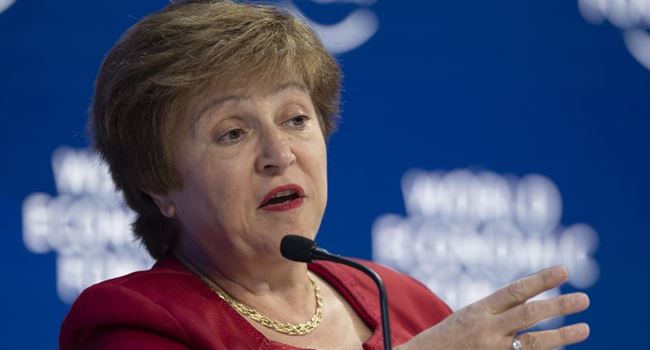Business
Impending recession could be worse than that of 2008 —IMF

A statement from the International Monetary Fund (IMF) Monday said the impending global financial crisis, spurred by the COVID-19 plague might equal the Great Recession of 2008 in magnitude and impact or even worse.
Kristalina Georgieva, the institution’s chief particularly said emerging and low-income economies are vulnerable to the headwinds and the swiftly increasing fatality from the pandemic.
“… advanced economies are generally in a better position to respond to the crisis, but many emerging markets and low-income countries face significant challenges. They are badly affected by outward capital flows, and domestic activity will be severely impacted as countries respond to the epidemic,” the IMF boss said.
Georgieva noted the necessity of oneness in these hard times, especially the need for countries to be single-minded in defending lives and curbing economic threats.
“First, the outlook for global growth: for 2020 it is negative — a recession at least as bad as during the global financial crisis or worse. But we expect recovery in 2021.”
“To get there, it is paramount to prioritise containment and strengthen health systems — everywhere.”
She foresaw that the current austerity would worsen but equally remarked that finding remedy to the plague early would be favourable to recovery.
She said “we strongly support the extraordinary fiscal actions many countries have already taken to boost health systems and protect affected workers and firms. We welcome the moves of major central banks to ease monetary policy.
Read also: NSE trading floors shut over coronavirus
“Investors have already removed $83bn from emerging markets since the beginning of the crisis, the largest capital outflow ever recorded. We are particularly concerned about low-income countries in debt distress — an issue on which we are working closely with the World Bank.”
The IMF is currently taking stock by deploying bilateral and multilateral surveillance at the same time devising reforms limit the effects of the crisis on its members.
She said “We will massively step up emergency finance —nearly 80 countries are requesting our help — and we are working closely with the other international financial institutions to provide a strong coordinated response.
“We are replenishing the Catastrophe Containment and Relief Trust to help the poorest countries. We welcome the pledges already made and call on others to join. We stand ready to deploy all our $1tn lending capacity. And we are looking at other available options.”
A great many low and middle income economies had approached the IMF to obtain a special drawing rights allocation.
“We are exploring this option with our membership,” the IMF boss said.
Join the conversation
Support Ripples Nigeria, hold up solutions journalism
Balanced, fearless journalism driven by data comes at huge financial costs.
As a media platform, we hold leadership accountable and will not trade the right to press freedom and free speech for a piece of cake.
If you like what we do, and are ready to uphold solutions journalism, kindly donate to the Ripples Nigeria cause.
Your support would help to ensure that citizens and institutions continue to have free access to credible and reliable information for societal development.
























